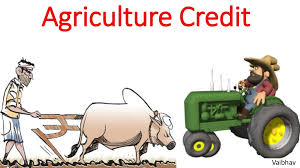Some scholars argue that the lack of credit in sufficient quantity is a major constraint to agricultural development. They rest their argument on the fact that the adoption of most technologies involves the purchase of improved inputs.
In the previous section, it was mentioned that most farmers in developing countries are poor, thus they do not have the financial resources to purchase such inputs, and the indigenous credit system cannot supply the needed credit on acceptable terms. Consequently, the lack of credit becomes a major constraint for agricultural development.
Read Also: Blackleg (cruciferous plants): Description, Damages Caused, Control and Preventive Measures
Importance of Credit to the Farmer

Credit can help improve the farmers’ situation in the following ways:
1. Protection Against Adverse Conditions
The use of credit can assist the farmer in facing adverse weather, disease conditions, and price uncertainties in farming. While it is virtually impossible to eliminate all forms of risks in farming, credit can play a major role in protecting the business from financial failure or liquidation when adverse conditions occur.
2. Meeting Seasonal and Annual Fluctuations in Income and Expenditures
Inputs must be purchased in one period, and products are sold later in the year, with very little cash inflows and outflows occurring at the same time. Using credit to smooth out these fluctuations and match cash inflows and outflows is essential to efficient operation.
3. For Production Purposes
This may be to buy inputs such as seeds, fertilizers, tractors, chemicals, etc.
4. Increase Efficiency
The use of credit makes it possible to substitute one resource for another. For example, machinery might be substituted for labor as a means of reducing cost, improving timeliness, and increasing the efficiency of the farm business.
5. Adjust to Changing Economic Conditions
New technological developments or changing market conditions may require major adjustments. For example, a shift from one enterprise to another may require major capital investments.
6. To Meet Non-Productive Purposes
Any credit in possession of the farmer can come in handy for meeting expenses such as marriages, children’s school fees, funerals, festivals, clothing, and feeding the family.
Read Also: 17 Medicinal Health Benefits Of Lotus Seed (Nelumbo nucifera)
Essential Conditions Necessary for Credit to Facilitate Agricultural Development

Some scholars argue that it is not the lack of credit that limits the modernization of agriculture, but the absence of other “essentials” necessary for development. Extending credit to small farmers who do not have the ability to use it profitably could be a disservice.
The farmers will only acquire a debt obligation without any concomitant increase in income to repay. Most may spend such credit on consumption purposes instead of production purposes. The lending institutions, on the other hand, will be burdened with collection problems.
The essential conditions are that:
- Agricultural research must have developed improved technologies that are clearly superior to traditional methods.
- Farmers must have seen practical demonstrations of the new technologies, understand them, and be willing to use them.
- Farmers must have confidence that the fertilizers, seeds, pesticides, and other equipment needed to adopt the new practices will be available in the villages at the proper time and in the required amounts.
- The necessary credit to purchase these inputs will be made available at the required time.
- Farmers must be assured that there will be a market for the extra production at reasonable market prices.
An efficient credit program is essential and should include:
i. Adequate amounts of credit
ii. Credit availability at the right time
iii. Credit availability at affordable interest rates
iv. Favorable repayment conditions
v. Credit availability for the desired farm operations
vi. Minimal bureaucratic procedures
Advantages of an Efficient Credit Program
i. Farmers face fewer debt burdens
ii. Fewer collection problems for lenders
iii. Higher rates of repayment
iv. Less credit diversion
v. Lower default rates
Roles Credit Can Play to Facilitate Agricultural Development and Finance
If profitable technologies exist and farmers are aware of their value:
- Adoption by small farmers will be enhanced by available credit for purchasing the improved inputs that are needed.
- Farm operations will be conducted in a timely manner.
- Hired labor can be easily accommodated.
- Increased yields will be experienced.
- Increased profits from each enterprise.
- Savings will increase on the part of farmers.
- Expansion in production and productive capacity will occur over time.
- Increased food availability for the populace.
- An increase in raw materials for local manufacturers and processors.
- Reduced food importation.
- Exportation of farmers’ products will be enhanced, increasing foreign exchange generation.
- Improvement in the standard of living of the populace.
Do you have any questions, suggestions, or contributions? If so, please feel free to use the comment box below to share your thoughts. We also encourage you to kindly share this information with others who might benefit from it. Since we can’t reach everyone at once, we truly appreciate your help in spreading the word. Thank you so much for your support and for sharing!

